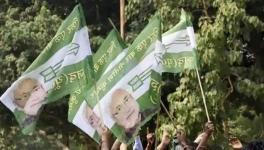Why is the RSS Afraid of Words?
On the 13th of March, the ABVP-Bajrang Dal attacked a meeting in Muzzaffarpur, Bihar, called to hear some of us who have studied in Jawaharlal Nehru University (JNU) talk about what the university stands for. On one side, there were women, men and youth from all walks of life who had come to listen to Professors Subodh Malakar, Jagdish Chaturvedi, Qaiser Shamim, cultural activist Vijay Shankar Chaudhuri, Kavita Krishnan, and others. On the other side were 30-40 goons (initially), wielding lathis and throwing stones. Their numbers swelled with time. The goons’ only intent was to silence our voices; their only instrument violence.
They did not succeed. We held out for quite some time, then marched through the streets of Muzzaffarpur. The march ended in the office of one of the left parties, CPI (ML-Liberation) and a meeting was held in their compound., All of us spoke. The Nagrik Manch, a platform of the citizens of Muzzaffarpur that had organised the meeting, held a press conference condemning the attack and promising to continue their activities.
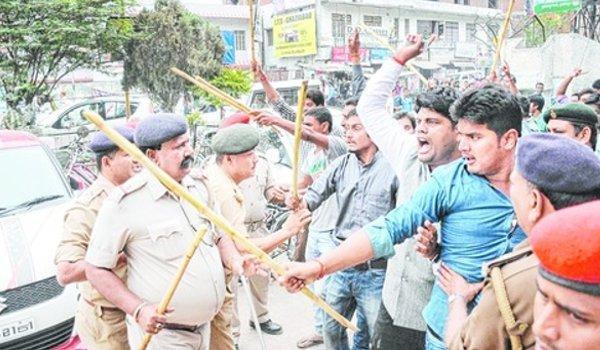
Why do words threaten the RSS? Why are they afraid of other voices, other viewpoints? Why are they unable to tell the people their concept of the nation instead of believing in silencing all voices different from theirs?
40 years back, as students in JNU, we took on Mrs. Gandhi's Emergency. During a 3-day strike in JNU against the expulsion of SFI student leader Ashoklata Jain, I was kidnapped from the campus by a group of plainclothes police lead by P.S. Bhinder, then DIG (Range). Bhinder was indicted by the Shah Commission as one of the key figures in Delhi during the Emergency, and a close confidant of Sanjay Gandhi. On the second day of the strike, we stopped Maneka Gandhi -- then the crown princess of Emergency, now a Cabinet Minister in the Modi Government -- from attending class in the School of Languages. Soon after my detention, I was joined by D.P. Tripathi, then President of the Students Union and now a Rajya Sabha Member of the NCP. I remained under the Maintenance of Internal Security Act (MISA) for a year.
The student movement in JNU has always been about what is happening in the country, not just about the internal issues of the university. Yes, struggle for hostels, better mess and other facilities are a part of the students’ movement on the campus. But there has always been a vital connection to the wider struggles of the working place, women, dalits and the adivasis in the country. Even now, the JNU Students Union is in the forefront of student protests against the huge cutbacks in Higher Education introduced by HRD Minister Smriti Irani.
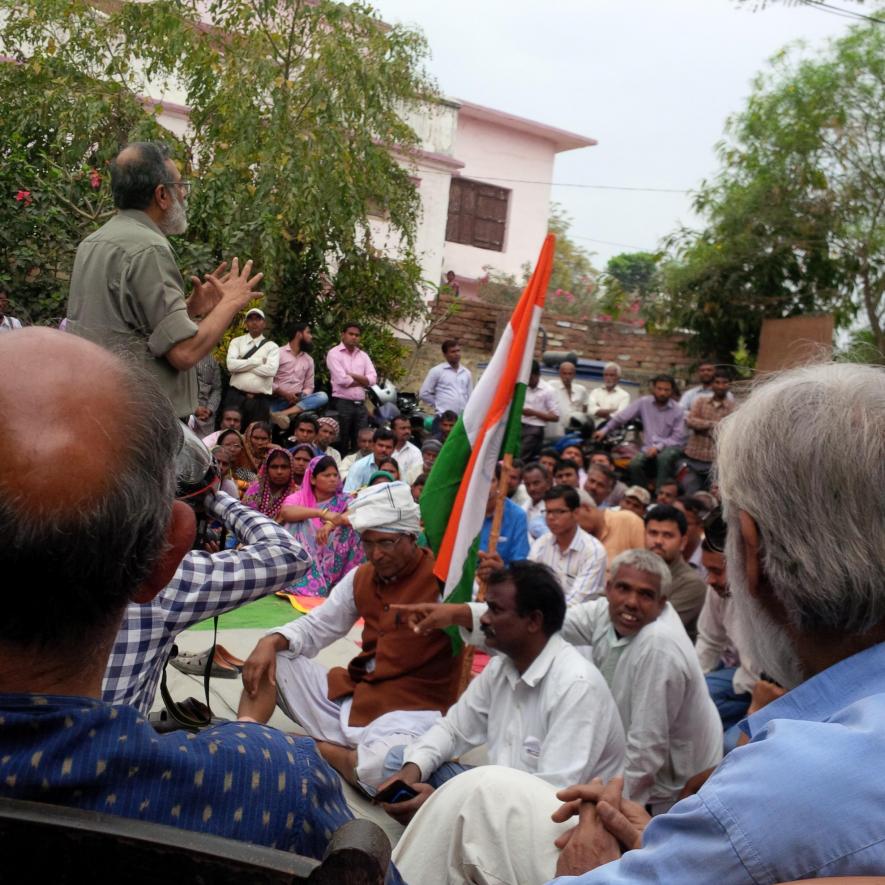
The story of JNU spans many decades of student activism, but this is not the reason for the attack on JNU. The BJP and its mother organisation, the RSS, are desperate. They are desperate for a plank that will replace the 2014 election jumlas people are unable to forget. They are desperate to erase from our memories Rohit Vemula – a dalit student who dared to dream of the stars – and the role that two BJP ministers played in his death. They want to erase from our memory the fact that two cabinet ministers of the Modi government – Smriti Irani and Bandaru Dattatreya – wrote to the Hyderabad Central University calling him anti-national, paving the way for his expulsion. They want to divert our attention from the failure of the economy, shrinking industrial production and exports, and the increasing crisis in agriculture.
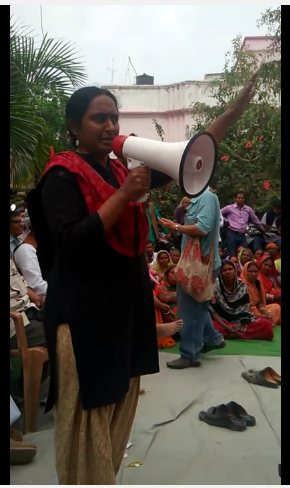
That is why a desperate RSS and the BJP need a target. A small enough target that they can hope to demolish and create a fear psychosis:submit or else.
JNU is a small university by Indian standards. It has about 8,000 students. It has been always an intellectually vibrant place where every issue under the sun is discussed and debated. Where teachers and students can sit across a table or in a classroom, and discuss the most controversial topics without fear. That is what a university stands for, or should.
In such a place, if your beliefs cannot withstand critical analysis, it is hard. While radical ideas have done well in JNU, the ABVP has fared badly. Those wanting a discourse of unthinking hatred and divisions find JNU a difficult place.
The RSS claims it is nationalist and the JNU students are not. The Home Minister, the Finance Minister, and the Human Resources Minister – 3 cabinet ministers of this government – are spending much of their “nationalist” time on attacking JNU rather than governing the country. The RSS has expressed its “dismay” over JNU’s anti-national activities. This is taking out the big guns for a small target; certainly a much smaller target than Delhi and Bihar, where they have been soundly whipped by the people.
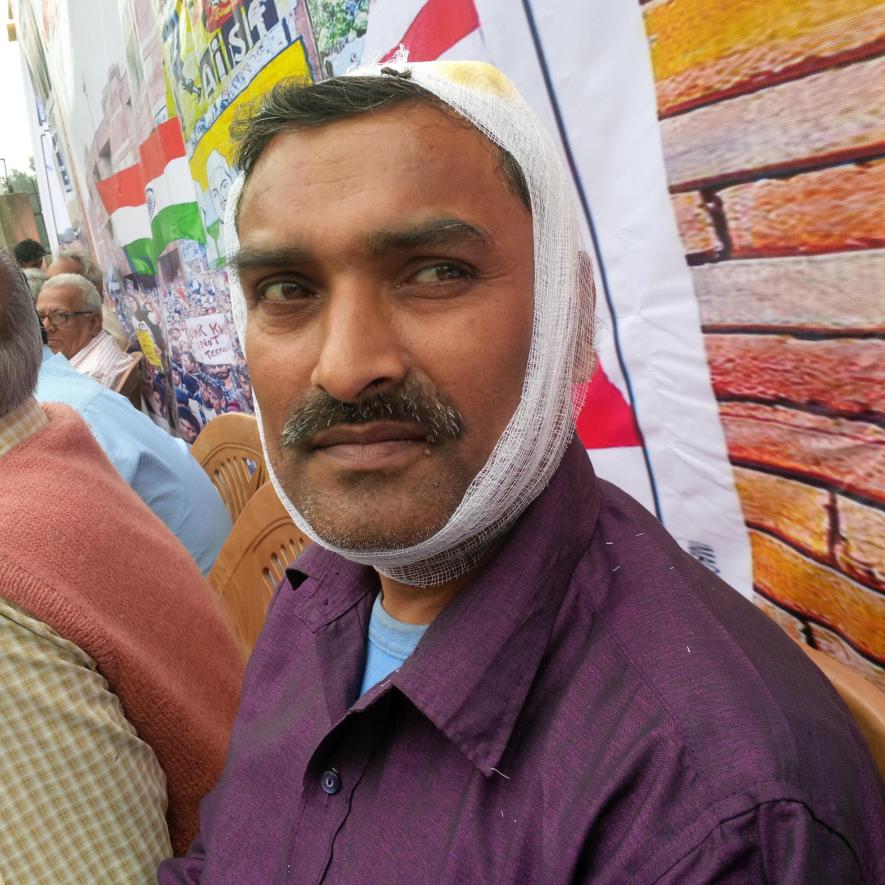
Why does the RSS need to display its “nationalism” by attacking a small university? Why can't it display its nationalism through its record instead of attacking others for not being nationalist enough?
The answer is simple. It does not have any nationalism to fall back on. The only political force in the country – apart from the Muslim League – that played no role in the struggle against British colonial rule was the RSS. The RSS not only opposed the national movement, but it also condemned it for uniting all sections of the people, and all religions against the British. It also opposed the national flag: the green and the white represented other religions. According to the RSS, the only permissible colour in the national flag was saffron, the bhagwa jhanda that the RSS worships.
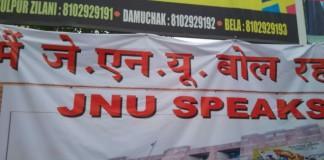
Even Savarkar, their only nationalist hero, had actually sought clemency while lodged in Andamans' Cellular Jail. In his letter asking for forgiveness dated November 14, 1913, he described himself as a ''prodigal son'' longing to return to the ''parental doors of the government''…
The RSS never accepted the Constitution either. For them, the Manusmriti should have been the basis of the Indian constitution, and not what the Constituent Assembly decided in 1949.
The RSS vision for India has always been the Hindu nation, a nation in which people of other religions will be second class citizens. In which the Bramhins will be the only leaders of thought. A militarised nation in which critical thinking and questioning will have no place. Only strait-jacketed minds, with violence as the only mode of debate. This is what we saw in Muzzaffarpur yesterday. And in the Patiala House courts earlier.
The RSS cannot impose such a militarised nation on the people only through its goon squads. It needs the support of the state. It needs the police to act on its behalf, and the judiciary to protect it from the consequences of its violence. It needs the inaction of others.
This is what the fight is all about. Can the BJP bend the state machinery and the judicial apparatus to its will, while its armed goons take on the opposition? Will those who feel they are outside the nationalism debate fight for the rights of others to speak?
To paraphrase Pastor Niemöller,
First they came for Akhlaq, and I did not speak out--
As I was not a Muslim.
Then they came for Rohit, and I did not speak out--
As I was not a Dalit.
Then they came for Kanhiya, and I did not speak out--
As I was never in JNU.
What happens now, when they come for me--
Who will then be left to speak for me?
Disclaimer: The views expressed here are the author's personal views, and do not necessarily represent the views of Newsclick"
Get the latest reports & analysis with people's perspective on Protests, movements & deep analytical videos, discussions of the current affairs in your Telegram app. Subscribe to NewsClick's Telegram channel & get Real-Time updates on stories, as they get published on our website.















